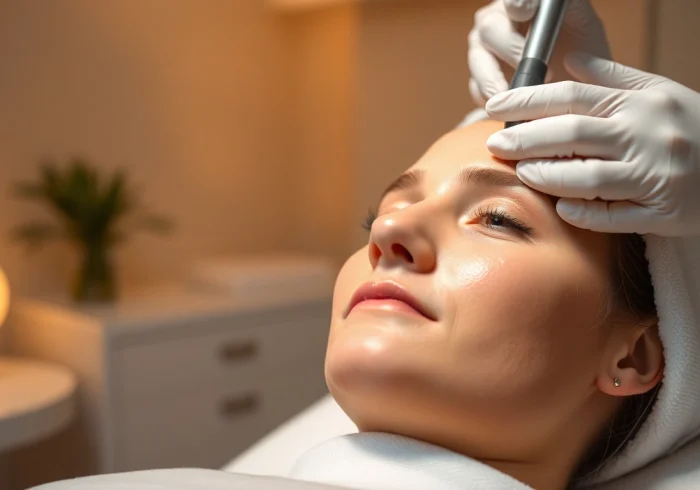Understanding Peptide Therapy
What is Peptide Therapy?
Peptide therapy is an innovative medical treatment that utilizes short chains of amino acids, known as peptides, to promote various physiological functions within the body. Peptides are integral to numerous biological processes, such as hormone regulation, immune function, and cellular growth. As our understanding of these molecules grows, peptide therapy is becoming increasingly popular among those seeking to enhance their health and well-being.
This therapy can naturally stimulate cellular pathways that may decline due to age, injury, or illness. By utilizing specific peptides, clinicians can tailor treatment plans addressing various health issues, including hormonal imbalances, chronic pain, and even age-related conditions. This versatility makes Peptide Therapy a fascinating area of study and practice within modern medicine, as it explores the potential to harness the body’s natural processes for healing and rejuvenation.
How Peptide Therapy Works
The effectiveness of peptide therapy lies in its ability to interact with the body’s receptors and signaling pathways, thereby influencing biochemical processes. Peptides act as messengers that can communicate with cells, enabling the regulation of numerous bodily functions.
For instance, certain peptides can enhance the release of hormones, stimulate muscle growth, facilitate fat loss, improve recovery times after exercise, and even influence mood and energy levels. When administered, peptides can assist in repairing damaged tissues and mitigating symptoms associated with chronic conditions.
The precise mechanism of action varies based on the type of peptide and its application. Generally, peptides can be injected, taken orally, or applied transdermally, which allows for various administration routes based on patient needs and the specific peptide used.
Benefits of Peptide Therapy
Peptide therapy offers a range of benefits that can significantly enhance a person’s quality of life. Some of the recognized advantages include:
- Hormonal Balance: Peptides can help restore hormonal levels, especially in individuals experiencing conditions like menopause or andropause.
- Enhanced Muscle Growth and Recovery: Certain peptides promote increased muscle mass and quicker recovery times, making them popular among athletes.
- Weight Management: Many peptides are designed to aid in weight loss by regulating appetite and enhancing metabolism.
- Improved Skin Health: Some peptides have shown promise in promoting skin elasticity and reducing the appearance of wrinkles.
- Boosted Immune Response: Certain peptides can enhance immune function, making individuals less susceptible to infections and diseases.
- Pain Relief: Peptide therapy may help managing chronic pain conditions by influencing pain pathways in the body.
Types of Peptides in Therapy
Commonly Used Peptides
There are numerous peptides utilized in therapy, each designed for specific health outcomes. Some of the most common peptides include:
- HGH Fragment 176-191: Known to assist in fat loss while preserving muscle mass.
- Melanotan: Often used for skin tanning and may have applications in sexual health.
- BPC-157: Recognized for its regenerative capabilities, particularly in healing muscles, tendons, and ligaments.
- Thymosin Beta-4: This peptide is involved in tissue repair and is believed to have anti-inflammatory properties.
- GHRP-6: A growth hormone-releasing peptide that facilitates muscle growth and fat burning.
- IGF-1: This peptide aids in muscle development and repair, making it popular in athletic circles.
Peptide Therapy Applications
Peptide therapy has diverse applications across various fields, including:
- Anti-Aging: Many individuals turn to peptide therapy for its potential to reverse or slow aging processes.
- Performance Enhancement: Athletes may utilize peptides to optimize their training and recovery.
- Weight Loss: Various peptides can assist individuals in achieving sustainable weight loss goals.
- Recovery and Rehabilitation: Peptides can be instrumental in recovery post-injury or surgery.
- Skin Care: Cosmetic peptides are popular in dermatology for improving skin texture and reducing signs of aging.
Research on Peptide Efficacy
Research into peptide therapy is extensive and ongoing, with numerous studies aiming to validate the efficacy and safety of different peptides. Many clinical trials have shown promising results, particularly in fields like sports medicine, geriatric medicine, and dermatology.
As scientists continue to unlock the potential of peptides, their therapeutic uses may expand, leading to new treatments for various medical conditions. Current literature suggests peptides can play a vital role in regenerative medicine and may revolutionize how we approach health and wellness.
The Process of Receiving Peptide Therapy
Consultation and Assessment
Before starting peptide therapy, an initial consultation with a qualified healthcare provider is essential. This step allows the practitioner to gather comprehensive medical history, assess current health conditions, and discuss specific concerns and goals with the patient.
During this assessment, biochemical testing may also be conducted. Such tests can help determine hormonal levels, nutrient deficiencies, or other underlying issues, thus allowing for a more personalized treatment approach. Moreover, professionals can educate patients on the potential benefits and risks associated with peptide therapy.
Treatment Protocols for Peptide Therapy
The treatment protocol for peptide therapy can vary widely based on the specific peptides being used and the individual goals of the patient. Typically, the process begins with the selection of appropriate peptides tailored to the patient’s needs.
Peptides may be administered in various forms, including:
- Injectables: One of the most common methods, allowing peptides to enter the bloodstream directly.
- Oral Supplements: Certain peptides can be taken in capsule form, although bioavailability varies.
- Topical Applications: Some peptide formulations can be applied to the skin for localized benefits.
Throughout the treatment period, healthcare professionals will regularly monitor patient progress and may adjust dosages or modify the peptide regimen as needed to optimize results.
Follow-Up and Assessment
Follow-up appointments are crucial in peptide therapy to assess the treatment’s effectiveness and adjust as necessary. Regular check-ins with a healthcare provider ensure that the patient is experiencing the desired outcomes and allows for early detection of any potential side effects.
Providers may also encourage patients to maintain a healthy lifestyle during the therapy, as diet, exercise, and sleep can significantly affect overall results. Continuous assessment can help in fine-tuning the treatment protocol for maximum efficacy.
Potential Side Effects and Considerations
Common Side Effects of Peptide Therapy
While peptide therapy is generally considered safe and well-tolerated, some individuals may experience side effects. Common side effects could include:
- Injection site reactions, such as redness or swelling.
- Headaches or dizziness.
- Gastrointestinal disturbances, such as nausea or diarrhea.
Most side effects are mild and temporary, but it’s essential for individuals to communicate any adverse reactions to their healthcare providers for timely management.
Who Should Avoid Peptide Therapy?
Not everyone may be suitable for peptide therapy. Individuals with certain medical conditions, such as active cancer, or those who are pregnant or breastfeeding, may need to avoid this treatment.
A comprehensive assessment conducted by a qualified practitioner can determine whether peptide therapy is appropriate based on individual health status and goals. Open communication about any allergies, medical history, and current medications is critical to ensure patient safety.
Long-Term Safety of Peptide Therapy
Although many studies indicate that peptide therapy is generally safe, comprehensive research into the long-term effects is still emerging. Individuals should always consult with experienced healthcare providers regarding their treatment options and weigh the benefits against any potential risks.
Monitoring and follow-ups play a key role in ensuring the long-term efficacy and safety of treatment, allowing for adjustments to mitigate risks while maximizing the therapeutic benefits.
Future of Peptide Therapy
Emerging Trends in Peptide Applications
As research progresses, new applications for peptide therapy are expected to arise, reflecting advancements in our understanding of peptides and their interactions with biological systems. Future potential areas of interest include:
- Enhanced formulations for more effective delivery methods.
- Combining peptide therapy with other treatment modalities for synergistic effects.
- Personalized medicine approaches, which fine-tune peptide therapies based on genetic profiles.
Continuous Research in Peptide Therapy
Research initiatives are continually exploring the breadth of peptide therapy applications. Ongoing studies are crucial to validate existing findings and test new hypotheses, ensuring that peptide therapy remains at the forefront of modern medicine.
Clinical trials evaluating the efficacy of new peptides for various health conditions, such as metabolic disorders and aging-related issues, are currently underway, promising to broaden the scope of treatments available.
Patient Testimonials and Success Stories
Numerous anecdotal accounts and testimonials highlight the positive outcomes associated with peptide therapy. Patients have reported significant improvements in their quality of life, from increased energy and strength to improved mood and mental clarity.
Success stories often serve as powerful motivators for individuals considering peptide therapy, as they showcase the potential of these treatments to address diverse health challenges and contribute to overall well-being.



